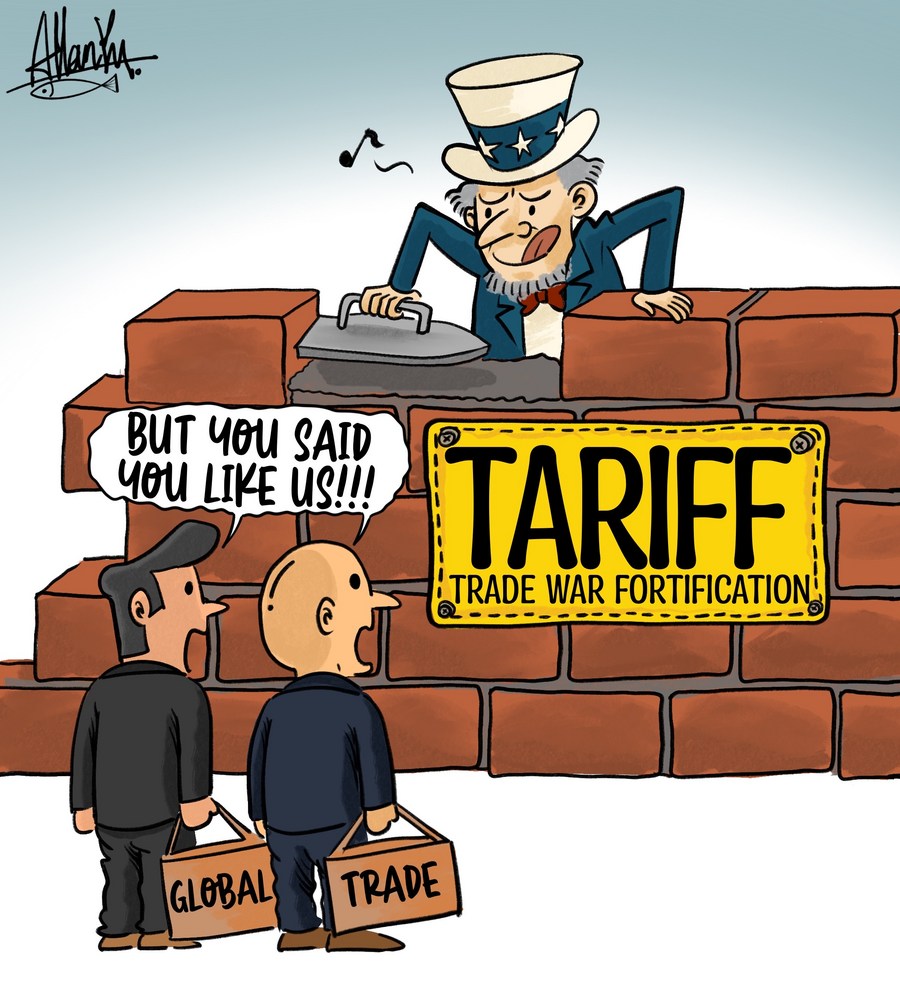Tariff Turbulence: How Trump's Trade War Reshaped The Tech Industry

Table of Contents
Disruption of Global Supply Chains
The imposition of tariffs created significant disruptions to global supply chains, forcing tech companies to reconsider their reliance on specific manufacturing hubs, primarily China. Increased import costs due to these trade barriers forced a reassessment of established practices and triggered significant changes in how companies source and manufacture their products. The impact rippled through the entire tech ecosystem.
- Increased manufacturing costs due to tariffs on imported components: Tariffs dramatically increased the cost of essential components like semiconductors, displays, and other crucial parts, squeezing profit margins and forcing price adjustments.
- Search for alternative sourcing and manufacturing locations (e.g., Vietnam, India, Mexico): To mitigate the increased costs and avoid reliance on a single manufacturing base, companies began diversifying their supply chains, leading to a geographical shift in production. Nearshoring and friendshoring became key strategies.
- Delays in product releases due to supply chain bottlenecks: The disruption caused delays and uncertainty, impacting product launches and leading to increased inventory management challenges.
- Increased logistical complexity and associated costs: Navigating new supply chains and regulatory environments added complexity and cost to the production process.
- Restructuring of supply chains to mitigate future tariff risks: The experience of the trade war spurred companies to build more resilient and diversified supply chains, less vulnerable to future trade disputes. This involved meticulous risk assessment and strategic diversification strategies.
Impact on Specific Tech Sectors
Different tech sectors experienced varying degrees of impact from the Trump trade war tariffs. While some sectors were more directly affected than others, the ripples of this economic disruption were felt across the board.
- The semiconductor industry faced significant cost increases and production delays: As a globally interconnected industry reliant on complex supply chains and cross-border collaboration, the semiconductor industry was particularly vulnerable. The tariffs significantly increased production costs and created delays, affecting the entire tech ecosystem that relies on semiconductor chips.
- Smartphone manufacturers adjusted pricing strategies to absorb tariff costs or passed them onto consumers: Smartphone manufacturers faced a difficult choice: absorb the increased costs, impacting their profitability, or pass them onto consumers, potentially affecting market demand.
- Cloud computing companies faced challenges in managing infrastructure costs impacted by tariffs: The tariffs impacted the cost of servers, networking equipment, and other infrastructure components, forcing cloud providers to re-evaluate pricing and optimize their infrastructure strategies.
- The software industry, while less directly affected, experienced indirect consequences due to supply chain issues: Although the software industry itself wasn’t directly targeted by tariffs, disruptions to hardware supply chains impacted the availability of development tools and ultimately slowed down project timelines.
Shifting Geopolitical Landscape
The trade war exacerbated existing geopolitical tensions between the US and China, accelerating a trend towards tech nationalism and the decoupling of technology supply chains. The impact reached far beyond economic considerations, profoundly influencing global relations and technology policy.
- Increased investment in domestic manufacturing and R&D within the US: The trade war spurred efforts to bring manufacturing back to the US ("reshoring") and incentivize domestic research and development to reduce reliance on foreign suppliers.
- Attempts by various countries to reduce reliance on specific countries for critical technologies: Countries globally recognized the risks of over-reliance on specific nations for essential technologies and sought to diversify their supply sources.
- Heightened scrutiny of foreign technology companies operating in the US: The trade war increased concerns about national security and the role of foreign tech companies, leading to increased regulatory scrutiny and potential restrictions.
- The emergence of alternative technology alliances and partnerships: The trade war fostered the creation of new technology alliances and partnerships, reflecting a shift towards regionalization and diversification of technological collaborations.
The Rise of "Nearshoring" and "Friendshoreing"
Companies began actively pursuing nearshoring and friendshoring strategies to diversify their supply chains and reduce vulnerability to future trade disruptions. This represented a fundamental shift in global supply chain management.
- Shifting production closer to domestic markets: Companies prioritized moving production to countries geographically closer to their target markets to reduce shipping times and costs, and to decrease vulnerability to trade conflicts.
- Partnering with companies in politically and economically aligned countries: "Friendshoreing" involved prioritizing partnerships with companies in countries with shared political and economic values to build trust and stability in the supply chain.
- Increased investment in automation and robotics to reduce reliance on low-cost labor: To offset the increased costs associated with nearshoring and friendshoring, many companies invested heavily in automation and robotics to streamline production and reduce labor costs.
Conclusion
Trump's trade war left an undeniable mark on the tech industry. The imposition of tariffs caused significant supply chain disruptions, impacting various tech sectors differently, and accelerated the shift towards a more fragmented global technological landscape. Companies learned valuable lessons about diversifying their supply chains and mitigating future risks associated with global trade tensions. Understanding the lasting consequences of this “Tariff Turbulence” is crucial for navigating the complexities of international trade and ensuring future resilience in the tech sector. By analyzing these effects and adapting strategies accordingly, tech companies can better prepare for future economic and geopolitical uncertainties, making informed decisions to minimize the impact of potential future trade wars or similar economic disruptions. Learning from the lessons of the Trump trade war is vital to the long-term success and stability within the tech industry. Ignoring the lessons learned from this period of Tariff Turbulence could prove costly in the future.

Featured Posts
-
 More Than Bmw And Porsche Western Automakers Struggle In Chinas Shifting Market
May 13, 2025
More Than Bmw And Porsche Western Automakers Struggle In Chinas Shifting Market
May 13, 2025 -
 Confirmation Sam Elliott Joins The Cast Of Landman Season 2
May 13, 2025
Confirmation Sam Elliott Joins The Cast Of Landman Season 2
May 13, 2025 -
 The Importance Of Angus Building A Recurring Character In Elsbeths Narrative
May 13, 2025
The Importance Of Angus Building A Recurring Character In Elsbeths Narrative
May 13, 2025 -
 Dooms Dark Ages How Classic Inspiration Shapes Modern Development
May 13, 2025
Dooms Dark Ages How Classic Inspiration Shapes Modern Development
May 13, 2025 -
 Search For Missing 79 Year Old Woman In Portola Valley Preserve Continues
May 13, 2025
Search For Missing 79 Year Old Woman In Portola Valley Preserve Continues
May 13, 2025
